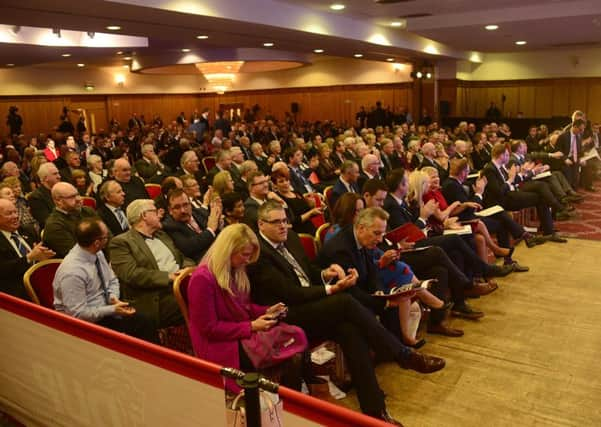Sam McBride analysis: With power shift to London, Dodds is the star of the show


The conference erupted in wild applause and shouts of appreciation which went on and on. Like much of Saturday’s highly controlled conference, it wasn’t entirely spontaneous – ear-piercing music cued the crowed for when to roar its approval and flags were left on seats to be waved, adding to the raucous spectacle.
But it wasn’t simply the product of clever emotional engineering. There are people in the DUP who have doubts about Mrs Foster, but there are many who feel that she has been either unfairly treated or, even if they think she has been the author of some of her woes, they admire how she has stuck at the job when others might have walked away.
Advertisement
Hide AdAdvertisement
Hide AdBut although the leader will always be in focus at a conference, Saturday was striking for what the deputy leader said. Nigel Dodds delivered a speech which in any other year would have been made by the leader.
Packed with political meat, oozing confidence and outlining what he will do in the coming year, the North Belfast MP’s speech was far more significant than that delivered by the leader: Staunchly defending Mrs Foster, openly deriding Sinn Féin, explaining the Tory relationship and then ranging through some of the major national policy debates.
If Mr Dodds had ambitions of taking the top job, it was the sort of speech which could make an under pressure leader nervous. As it is, there is a firm belief across the DUP that Mr Dodds does not want to be leader.
Rather, the nature of Mr Dodds’ speech not only reflected his ability and confidence, but the reality that the political centre of gravity has shifted from an empty Stormont to the green benches of Westminster.
Advertisement
Hide AdAdvertisement
Hide AdAs increasing attention focused on Stormont over the last decade, the daily work of Northern Ireland’s MPs in a chamber where they had little influence came to largely pass unreported.
But the confluence of Stormont’s prolonged collapse and the DUP’s critical position in Westminster has seen, with every month that passes, more intangible political power flowing to the DUP’s MPs.
There was a subtle but unmistakable message from both Mr Dodds and Mrs Foster on Saturday: They want Stormont back and they are prepared to take some political pain in the compromise necessary to realise that objective.
If Stormont is not resurrected, in a year’s time Mr Dodds, rather than Mrs Foster, might be making the leader’s speech – something which neither of them might welcome.